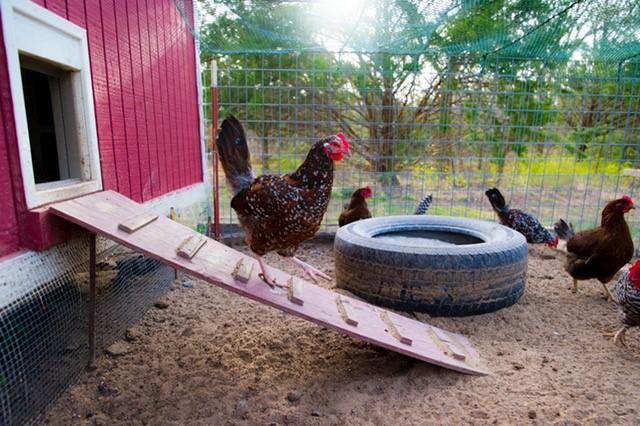
Agricultural News
Small Flock Chicken Operators Should Practice BioSecurity to Protect Against Avian Influenza
Tue, 21 Feb 2017 12:22:34 CST
 The highly pathogenic avian influenza outbreak that became the largest animal health emergency in U.S. history may have subsided, but vigilance is still needed.
The highly pathogenic avian influenza outbreak that became the largest animal health emergency in U.S. history may have subsided, but vigilance is still needed.
In January 2016, an outbreak of Highly Pathogenic Avian Influenza (HPAI) H7N8 virus was reported in a commercial turkey flock in Dubois County, Indiana. No other outbreaks in the United States have been detected since that time.
"Currently Europe and Asia are having a tremendous problem with avian influenza but we are not," said Dr. Barry Whitworth, veterinarian and Oklahoma State University Cooperative Extension food animal quality and health specialist. "The concern is HPAI, once established, can spread rapidly, killing 95 percent to 100 percent of a flock."
Arkansas and Kansas were among the states with reported cases of infected birds a few years ago, underscoring the need for Oklahoma poultry producers to be aware and understand the importance of biosecurity measures to control HPAI.
"The last reported cases in Arkansas and Kansas occurred in early summer of 2015, which is a positive, but everyone, small flock operators included, needs to follow biosecurity and best management practices to ensure we stay HPAI-free," said Dana Zook, OSU Cooperative Extension area livestock specialist.
Biosecurity - essentially doing everything possible in an operation to prevent disease from entering a flock - teamed with proper vaccination, disinfection and sanitation helps producers ward off disease-causing pathogens.
What can backyard poultry operators do?
Zook and Whitworth stress there are a number of practical methods a small flock operator can and should employ. First among them, the primary caretaker of the flock should not enter other poultry facilities, and visitors to the operator's flock should be kept at a minimum.
"Any necessary visitors should clean and disinfect their shoes or wear disposable boot covers prior to entering any pen," Zook said. "If handling birds, disposable gloves should be worn."
Another important protocol is to channel your inner Mr. Clean, and be obsessive about it. The producer and any visitor should clean and disinfect his or her hands, clothes, shoes and equipment before and after handling poultry.
"A good biosecurity practice is to have a pair of shoes kept next to the pen door that are only worn when inside the pen," Zook said.
Feed bins should be secured to prevent contamination by wild birds or rodents. Spoiled feed should be removed promptly to prevent attracting wild birds or rodents. Clean and disinfect all tools and equipment thought to have been contaminated. Promptly dispose of dead birds by burial or composting. Maintain effective rodent and insect control programs.
"Take care not to haul disease-causing pathogens home," Zook said. "If your birds have been near other poultry such as during a show or contest, clean and disinfect poultry cages and equipment before returning to your operation. After coming into contact with other birds, be sure to shower and wash clothing before handling your birds."
Whitworth recommends birds that have been near other poultry should be quarantined from the rest of the flock for 14 days.
"This will give infected birds time to exhibit symptoms," he said. "New birds should be kept from your flock for at least 30 days before putting them with the rest of the birds."
Whitworth stresses the health of a producer's birds should be the first priority. Do not share birds, borrow lawn and garden equipment, tools or poultry supplies from other bird owners. Items that cannot be disinfected such as wood pallets or egg cartons should not be shared.
"Birds infected with HPAI may exhibit a lack of energy and appetite, decreased egg production, abnormal egg shape, respiratory distress, diarrhea and swelling or purple discoloration of the head, eyelids, comb, wattles and legs," Whitworth said.
Know when to report sick birds
Although isolated instances of mortality are common in a backyard flock and do not require reporting, significantly large numbers of sickness and mortality should be reported to officials.
Zook and Whitworth stress prompt diagnosis of widespread sickness in flocks is a critical step in containing any devastating disease. For diagnosis of any widespread disease, contact the Oklahoma Animal Disease Diagnostic Laboratory on OSU's Stillwater campus at 405-744-6623.
"The OADDL works closely with the Oklahoma Department of Agriculture, Food and Forestry to test and identify contagious diseases," Zook said. "If avian influenza is suspected in an Oklahoma backyard poultry flock, contact your county Extension agricultural educator, local veterinarian or the state veterinarian immediately."
Additional information from OSU's Division of Agricultural Sciences and Natural Resources about poultry diseases, backyard poultry operations and similar poultry-related subjects is available online. Simply type "poultry" in the search function and relevant OSU Fact Sheets will be listed for the viewer.
Source - Oklahoma State University
WebReadyTM Powered by WireReady® NSI
Top Agricultural News
More Headlines...




